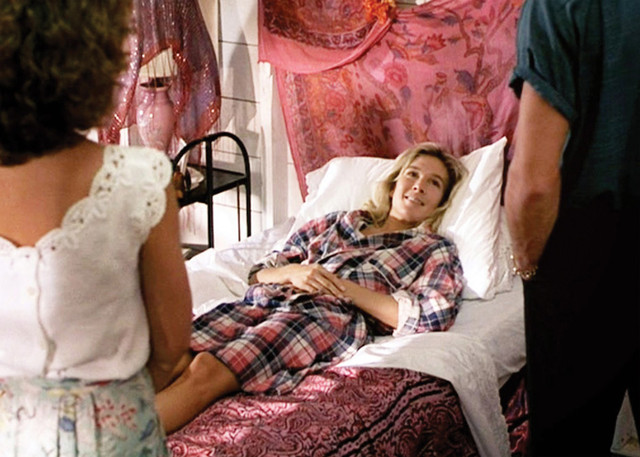Wanna enjoy this article on the go? You can also listen to this piece read by managing editor Emily Rems in a special bonus episode of our ‘Poptarts’ podcast. Just click on over to our iTunes page and select episode 4.
Beloved for its triumphant coming-of-age narrative and the unlikely romance between Jennifer Grey’s awkward, naïve Baby and Patrick Swayze’s hunky, bad-boy Johnny (nobody puts Baby in the corner, you guys), Dirty Dancing is less often remembered for the plot device that brings Baby and Johnny together: a pre-Roe v. Wade illegal abortion.
Released in 1987, Dirty Dancing made a profound case for the importance of women’s right to safe abortion, while also acknowledging the effect that class and privilege have on its access. And perhaps that’s no surprise. Ever since the passage of Roe v. Wade in 1973, our country has seen a steady effort from anti-choice lawmakers to overturn or severely limit the legislation. Their first win came in 1976 in the form of the Hyde Amendment, which banned the use of federal funding for abortion care and limited access to healthcare services for low-income women. The amendment was upheld in 1980, and with the 1984 re-election of Ronald Reagan and anti-choice Republicans winning control of Congress, it looked like women’s hard-won right to choose was under serious threat. It was into this milieu that Dirty Dancing, and its pro-choice narrative, was born.
In the 30 years since the film’s debut, and 40 years since Roe v. Wade, few other Hollywood offerings have tackled the subject of abortion, and fewer still have presented such a clear-eyed perspective on the topic. But, like Dirty Dancing, each offers a window into both the attitudes, and the political climate of the time in which it was made.
A box office hit, Dirty Dancing was the first film to sell over a million copies on home video. Set in 1963—ten years before the historic Roe v. Wade decision of 1973—the plot centers on 17-year-old Baby’s family vacation at Kellerman’s resort, where she’s fascinated by the resident dance staff, led by Johnny and sexy former Rockette Penny (Cynthia Rhodes). Penny becomes pregnant, and the only way for her to procure an illegal abortion is for wealthy Baby to give her money and then take her place at an upcoming dance performance with Johnny. The dangerous procedure Penny endures almost kills her, and in a climactic scene, Baby’s father, a legitimate doctor, is called in to save her life. It was a groundbreaking moment in film history, where commentary on abortion rights, social class, and blockbuster cinema collided.
“When I made the movie in ’87 about ’63, and I put in an illegal abortion, everyone said, ‘Why? There was [the passage of] Roe v. Wade—what are you doing this for?’” Dirty Dancing screenwriter and co-producer Eleanor Bergstein recalls. “And I said, ‘Well, I don’t know that it will always be [legal].’ And very young women didn’t remember a time before Roe v. Wade, so I hoped they would learn not to take it for granted. I hoped they would know what it was like before.”
Bergstein says she carefully folded the film’s abortion plotline into the very fabric of Dirty Dancing, to protect it from overzealous editors. “If you’re putting in a political theme,” Bergstein says, “you really better have it written into the story, because otherwise, the day will come when they’ll tell you to take it out.” She describes a national sponsor urging her to cut the abortion plot out of the film just before its release: “The studio came to me and said, OK Eleanor, we’ll pay for you to go back into the editing room and take the abortion out. And I had always known this day would come, and that I could then say, ‘Honestly, I would be happy to, but if I take it out the whole story collapses. There’s no reason for Baby to help Penny, for her to dance or fall in love with Johnny. None of these things will happen without the abortion, so I simply can’t do it, even though I’d be so happy to do what you want.’”
 Fast Times At Ridgemont High
Fast Times At Ridgemont High
Dirty Dancing stands in contrast to another movie made in the 1980s that had a much more nonchalant attitude toward abortion. The 1982 teen party film Fast Times at Ridgemont High—made at the very beginning of Reagan’s first term, after safe, legal abortion had been available for a decade—features an abortion plotline as one of many in a film about carefree teens navigating sex, drugs, and other high school extra-curriculars. When high school freshman Stacy, played by Jennifer Jason Lee, becomes pregnant after a sexual encounter with skeevy upperclassman Mike, she not only decides confidently to get an abortion, but also has no remorse about the decision. Notably, Stacy doesn’t have to worry about the federal funding restrictions of the 1976 Hyde Amendment. She’s privileged enough to access abortion without a second thought—she asks Mike to split the cost, but is able to afford it even without his help. And when she leaves the abortion clinic, Stacy is greeted by her older brother Brad, waiting outside to show his support for her decision and give her a ride home. This type of casual, unequivocally positive portrayal of abortion in film became more and more rare in the decades that followed, possibly in response to the increasing number of protests coming from the anti-choice movement.
 A Private Matter
A Private Matter
The 1990s brought an era when anti-choice activism became much more violent, with seven deadly attacks on abortion providers occurring within that 10-year span. A major Supreme Court ruling on abortion came in 1992, with Planned Parenthood v. Casey allowing states to enact abortion laws, so long as the law doesn’t place an undefined “undue burden” on women’s access to abortion. Network television shied away from showing abortion during this period, but the ’90s brought two made-for-TV HBO films with overtly pro-choice agendas. In a major shift from upbeat teen blockbusters with understated abortion sub-plots, these movies handled abortion with a serious, somber tone. A Private Matter (1992), made during the Republican presidency of George H.W. Bush, tells the true story of Sherri Finkbine, a woman who seeks an abortion after her use of the drug thalidomide. Four years later, the more widely viewed If These Walls Could Talk (1996), made during the Democratic presidency of Bill Clinton, highlights the many obstacles women having abortions have faced over several decades with three fictional abortion stories, each set 22 years apart—a widowed nurse who dies after an illegal abortion in 1952, a struggling mother of four who considers abortion in 1974, and a doctor who’s killed by an anti-choice protester in 1996. While If These Walls makes an important point about the risks doctors take providing abortions, it also uses a pre-Roe storyline to frame access to safe, legal abortions as an endangered way of life. Which was true even during the relatively liberal Clinton era, as conservative legislators tried to challenge Roe one red state at a time.

If These Walls Could Talk
In sharp contrast to If These Walls’ careful handling of abortion’s complexities, the 2000s brought a wave of popular comedy films that were stigmatizing, and even hostile, toward abortion. With the passage of the so-called Partial-Birth Abortion Ban Act in 2003—which Justice Ruth Bader Ginsburg called, in her dissent, “the first time since Roe [that] the Court blesses a prohibition with no exception safeguarding a woman’s health”—public outcry around abortion rights began ramping up. The pro-choice March for Women’s Lives, held in Washington, D.C., in 2004, was one of the biggest demonstrations in U.S. history to date, drawing between 500,000 and 800,000 demonstrators to the nation’s capital—comparable to the 2017 Women’s March on Washington.
Films made around this time seemed afraid to even broach the subject of terminating a pregnancy, possibly because producers didn’t want to alienate the conservative viewership that launched George W. Bush into the White House. The Judd Apatow movie Knocked Up (2007)—released in the middle of George W. Bush’s second conservative-Republican term—is now infamous for its refusal to even say the word abortion (it refers to the procedure only with the lines, “take care of it,” “the ‘A’ word,” and of course, “I won’t say it, but it rhymes with shmashmortion”). Knocked Up is particularly surreal in how it paints the female protagonist’s decision not to have an abortion. Successful, recently-promoted TV personality Alison (Katherine Heigl) cries repeatedly upon learning she’s pregnant by a one-night stand with unemployed slacker Ben (Seth Rogan), and her mother encourages her to have an abortion, reminding her that she’ll have a baby later when the time is right. The film offers no clues as to what influences Alison’s decision to become a mother, and we’re left with the message that choosing to bring an unwanted pregnancy to term is brave and moral. With jokes about everything from STDs to masturbation, Knocked Up doesn’t shy away from breaking other taboos, and it established Apatow as a king of raunchy, boundary-pushing comedy. So it’s all the more significant that the film takes such a conservative standpoint on abortion.
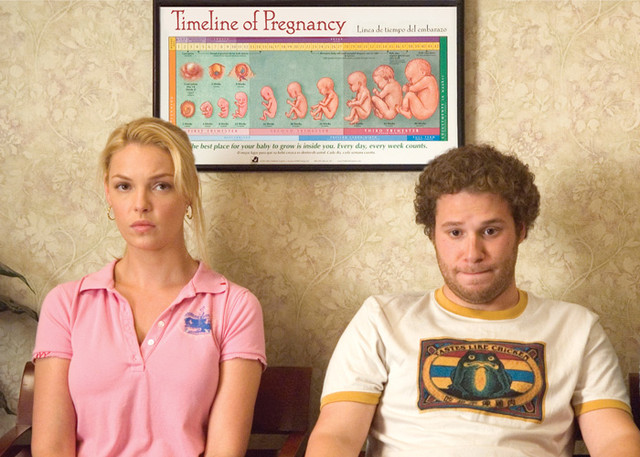 Knocked Up
Knocked Up
The same goes for 2007’s Juno—the hip, independent comedy-drama that portrayed adoption as an abortion alternative. When 16-year-old Juno becomes pregnant, she wants an abortion. There’s no discussion in the film about limits to abortion access—she simply picks up the phone, schedules her appointment, and walks to the clinic. However, Juno is deterred by her clinic experience—a classmate protesting outside begs her to think of her unborn fetus’ fingernails, water-stained magazines decorate the waiting room, and a young receptionist offers her berry-flavored condoms along with an inappropriate anecdote about how good they make her boyfriend’s junk smell.
Instead, Juno opts for adoption, and her nonchalance about that decision is laughably unrealistic—she tells the planned adoptive parents, “If I could just have the thing and give it to you now I totally would, but I’m guessing we should keep it in here and let it get a little cuter.” Perhaps some women feel this way about placing their babies up for adoption, but research shows that a significant portion struggle with difficult feelings during and after the process.
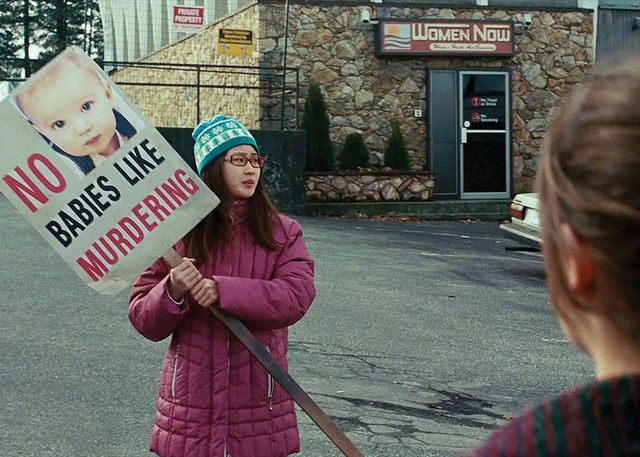 Juno
Juno
With both Knocked Up and Juno, the films’ plots couldn’t have existed if the main characters had gone through with their abortions. The opposite is also true, though—by choosing to show other alternatives to dealing with an unwanted pregnancy in a positive light, but erasing and judging abortion, both films appear to promote an anti-choice agenda. Unrealistic plots replace the obvious, most simple solution to an unwanted pregnancy.
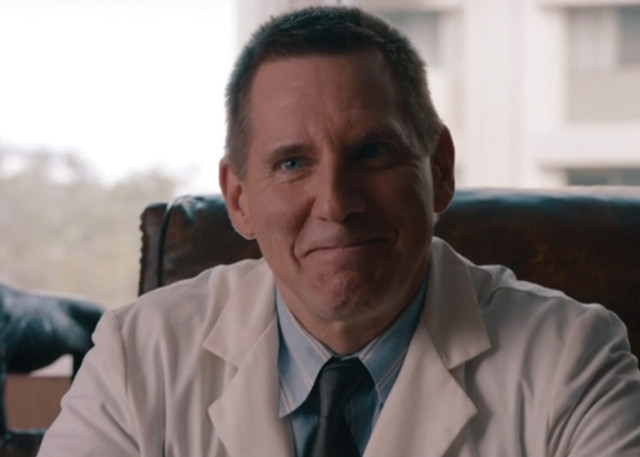 This Is 40
This Is 40
The tendency of films depicting women choosing not to have abortions continued into the early 2010s. With Apatow’s This Is 40 (2012), which was billed as a “sort-of sequel” to Knocked Up, the director once again all but erases abortion in accordance with this anti-choice trend. The same doctor that tells Heigl she’s pregnant in Knocked Up announces to Leslie Mann’s Debbie, “you’re having another baby!” No OB/GYN should ever use the phrases “you’re pregnant,” and “you’re having a baby” interchangeably—it’s an anti-choice misrepresentation of a pregnant woman’s options. In the 2010 film Blue Valentine, Cindy, played by Michelle Williams, plans to have an abortion up until she’s mid-procedure and tells the doctor to stop. She chooses to have a baby, and to start a family with new love interest Dean (played by Ryan Gosling), but the result is an unhappy marriage that leads to divorce. This plot line can be read as pro-choice—and even as a counterpoint to Knocked Up—as it shows that trying to force a relationship with a near-complete stranger for the sake of a baby doesn’t always turn out that well (even when he’s Ryan Gosling). But still, that message is subtle, and it’s notable that the film chooses not to state this position overtly. Also noteworthy is the film’s failure, as with many that came before it, to raise any issues around difficulty accessing abortion; Williams’ character is privileged enough to face only moral obstacles.
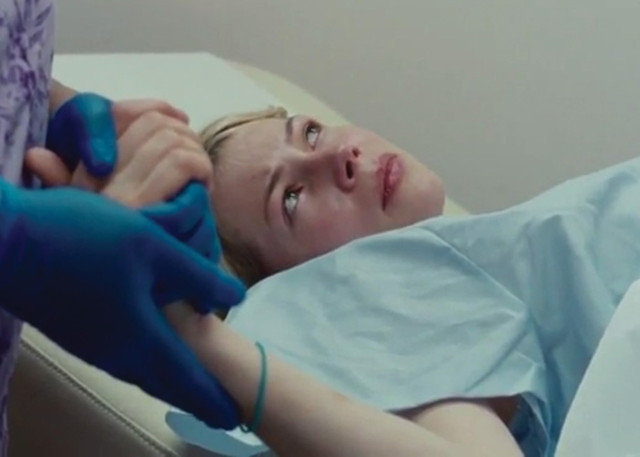
Blue Valentine
According to the Guttmacher Institute, states have enacted 1,074 abortion restrictions since the passage of Roe v. Wade, and more than a quarter of those were passed since 2010, following the midterm elections that put reproductive rights opponents in power in state capitals across the country. It wasn’t until well into Barack Obama’s second term, when state laws targeting abortion were at an all-time high, that popular film finally returned to unapologetically pro-choice depictions of abortion. Both 2014’s Obvious Child and 2015’s Grandma combine subversive comedy with an openness about abortion that’s rarely seen on screen. Obvious Child’s frankness about women’s bodies gives it a decidedly feminist tone. For example, the film opens with aspiring comedian Donna Stern (Jenny Slate), performing a set about vaginal discharge to a delighted audience. When Donna learns that she’s pregnant from a one-night stand, she knows abortion is the right choice, but she still has feelings about it. She discusses it openly with friends over wine, is scared to tell her mom, sheds a few tears during the procedure, but smiles at another patient in the recovery room. Donna laments that the procedure costs as much as her rent, but ultimately has no trouble accessing it with the help of her upper-class parents. When the computer programmer who impregnated her finds out about her abortion plans, he’s supportive—a model for men honoring women’s ownership of reproductive decisions. Obvious Child may be the most refreshingly honest depiction of abortion in film to date.
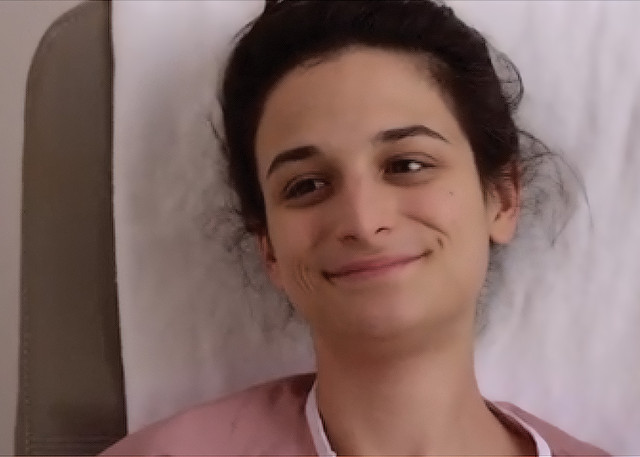
Obvious Child
In a similar vein, Grandma stars Lily Tomlin as smart-mouthed lesbian poet Elle, who takes her granddaughter Sage on a road trip around Los Angeles in search of the money Sage needs to terminate her pregnancy. Tomlin’s character is overtly feminist, lecturing her granddaughter about The Feminine Mystique and the importance of not using the word “slut,” while speaking loudly in public about abortion. Both films highlight the importance of abortion remaining safe and legal with references to the pre-Roe era—in Obvious Child, Donna’s mother admits to having had an illegal abortion, and Grandma’s Elle describes her pre-Roe abortion as “like a nightmare.” Neither Obvious Child nor Grandma go so far as to show how recent laws restricting abortion affect women’s ability to access it, but instead focus on privileged women’s experiences, and relegate unsafe, inaccessible abortion to the past. Still, these films are groundbreaking—and hilarious—in how they center abortion as a comedic theme.
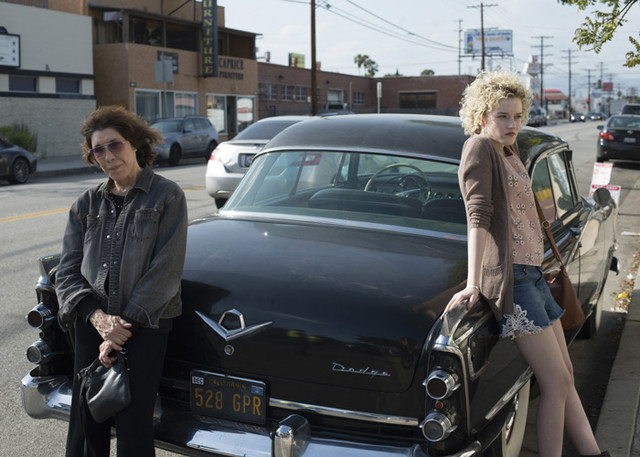
Grandma
From positive film depictions of abortion to those that perpetuate social stigmas, the last few decades have shown that popular movies have the power to make statements about abortion that influence culture, and educate the public. And 30 years after Dirty Dancing, we can reflect on how this film—perhaps better than any since—highlights how power and privilege intersect with abortion access. With the dawn of a scary new era that brings Republican promises to defund Planned Parenthood, and threats to overturn Roe v. Wade, how will future films respond?
It’s up to feminist filmmakers to rise to the challenge. Films can do the important work of erasing the stigma of abortion, and can spotlight the difficulty many women have both making this decision and accessing safe, legal procedures. If there were ever a time to push the representations of abortion in film even further, that time is now.
By Marisa Crawford
This article originally appeared in the April/May 2017 print edition of BUST Magazine. Subscribe today!
Top Image: Dirty Dancing
More from BUST
The Outrage Against Childfree Women Is Real — And Needs To Stop
The Fearless Girl Will Continue To Face Down The Charging Bull
Listen To A Feature Story From BUST’s New Issue About Abortion On Film

